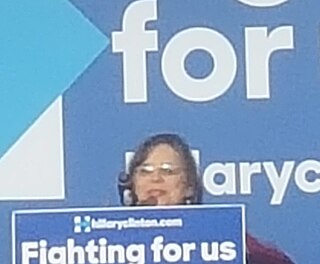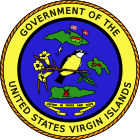
Politics of the United States Virgin Islands takes place in a framework of a presidential representative democratic dependency, whereby the Governor is the head of the territory's government, and of a multi-party system. United States Virgin Islands are an unincorporated and organized territory of the United States, administered by the Office of Insular Affairs of the United States Department of the Interior. Executive power is exercised by the local government of the Virgin Islands. The judiciary is independent of the executive and the legislature.

His Majesty's Government of the Virgin Islands is the democratically elected government of the British Overseas Territory of the British Virgin Islands. It is regulated by the Constitution of the British Virgin Islands.

Elections in the British Virgin Islands are conducted to elect members to the House of Assembly. In the British Virgin Islands elections are not conducted in relation to appointments to either the Executive or Judicial branches of Government, and there are no other publicly elected posts in the British Virgin Islands. Most elections are conducted as general elections, which under the Constitution are required to be held every four years, or as by-elections when a member of the House of Assembly dies or steps down. Since the re-introduction of democracy into the British Virgin Islands in 1950 there have been fifteen general elections, and three recorded by-elections. The last election was held on 25 February 2019.

The House of Assembly of the British Virgin Islands, until 2007 known as the Legislative Council, has 15 members: 13 directly elected for four-year terms, and two ex officio members.

Donna A. Lupardo is a member of the New York State Assembly representing the 123rd Assembly District, which includes the city of Binghamton, New York, as well as the towns of Vestal, New York and Union, New York. The villages of Johnson City, New York and Endicott, New York are contained within the Town of Union and also make up part of the district.

In the United States, increased restrictions and labeling of cannabis as a poison began in many states from 1906 onward, and outright prohibitions began in the 1920s. By the mid-1930s cannabis was regulated as a drug in every state, including 35 states that adopted the Uniform State Narcotic Drug Act. The first national regulation was the Marihuana Tax Act of 1937.

General elections were held in United States Virgin Islands on 4 November 2008, to elect 15 members of the Legislature and the Delegate to United States House of Representatives..

Ryan Francis Quarles is president of the Kentucky Community and Technical College System. An American Republican politician, he served as Agriculture Commissioner of Kentucky from 2016 to 2024 and in the Kentucky House of Representatives from 2011 to 2016.

Oregon Ballot Measure 80, also known as the Oregon Cannabis Tax Act, OCTA and Initiative-9, was an initiated state statute ballot measure on the November 6, 2012 general election ballot in Oregon. It would have allowed personal marijuana and hemp cultivation or use without a license and created a commission to regulate the sale of commercial marijuana. The act would also have set aside two percent of profits from cannabis sales to promote industrial hemp, biodiesel, fiber, protein, and oil.

The United States Virgin Islands general election was held on November 2, 2010. Voters chose the Governor of the United States Virgin Islands, the non-voting delegate to the U.S. House of Representatives and all fifteen seats in the Legislature of the Virgin Islands. The election coincided with the 2010 United States general election.

In the United States, cannabis is legal in 38 of 50 states for medical use and 24 states for recreational use. At the federal level, cannabis is classified as a Schedule I drug under the Controlled Substances Act, determined to have a high potential for abuse and no accepted medical use, prohibiting its use for any purpose. Despite this prohibition, federal law is generally not enforced against the possession, cultivation, or intrastate distribution of cannabis in states where such activity has been legalized. On May 1, 2024, the Associated Press reported on plans by the Drug Enforcement Administration to move marijuana to the less-restrictive Schedule III.

The United States Virgin Islands general election was held on 6 November 2012. Voters chose the non-voting delegate to the United States House of Representatives, the Board of Education, the Board of Elections, and all fifteen seats in the Legislature of the Virgin Islands.

The legal history of cannabis in the United States began with state-level prohibition in the early 20th century, with the first major federal limitations occurring in 1937. Starting with Oregon in 1973, individual states began to liberalize cannabis laws through decriminalization. In 1996, California became the first state to legalize medical cannabis, sparking a trend that spread to a majority of states by 2016. In 2012, Washington and Colorado became the first states to legalize cannabis for recreational use.

A two-part referendum was held in the United States Virgin Islands on 4 November 2014. Voters were asked whether they approve of extending the term of office of Senators from two to four years, and whether the cultivation and use of cannabis for medical and research purposes should be allowed.

The United States Virgin Islands general election was held on 4 November 2014. Voters chose the non-voting delegate to the United States House of Representatives, all fifteen seats in the Legislature of the Virgin Islands, and the Governor of the United States Virgin Islands.

Cannabis in Wisconsin is illegal for recreational use. Possession of any amount is punishable by up to 6 months in prison and a $1000 fine for a first offense. A second offense is punished as a felony with up to 3.5 years in prison and up to a $10,000 fine. At the local level, however, numerous municipalities and counties have decriminalized cannabis or lessened penalties for minor possession offenses. Medical use is legal only in the form of low-THC cannabis oil.

Cannabis in the United States Virgin Islands is legal for recreational use since January 18, 2023, under territorial law. Legislation to legalize was passed by the territorial legislature in 2022, and was signed into law on January 18. Medical use was legalized in 2019 through a bill that passed the Senate 9–4. It remains illegal under federal law.

The United States Virgin Islands general election was held on November 8, 2016. Voters chose the delegate to the United States House of Representatives and all fifteen seats in the Legislature of the Virgin Islands.

The Fifty-seventh Oklahoma Legislature was a meeting of the legislative branch of the government of Oklahoma, composed of the Senate and the House of Representatives. It met in Oklahoma City, Oklahoma from January 3, 2019, to January 3, 2021, during the first two years of the first administration of Governor Kevin Stitt. The November 2018 elections maintained Republican control of both the House and Senate.








